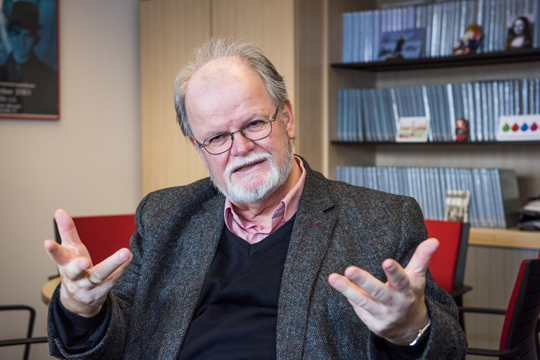Getting back to climate change
Freiburg, Apr 14, 2021
This 2021 summer semester the Saturday Uni – which is open to students, members of the university and members of the public – is taking place once again. The theme of the lectures is: ‘Der Klimawandel – Antworten auf eine Menschheitsfrage’ or ‘Climate Change – Answers to aspects of the human issue of climate change’. The pandemic means that the twelve-part course will be taking place online. Starting 24 April 2021, the first lecture ‘Was geschieht mit unseren CO2-Emissionen im globalen Klimasystem?’, or ‘Looking at what happens to our CO2 emissions in the global climatic system’, will be accessible on the Studium Generale video portal. Franziska Becker spoke to Prof. Dr. Werner Frick, head of Studium Generale, about the current theme.

Photo: Sandra Meyndt
Professor Frick, who is the target audience for the Studium Generale program?
Werner Frick: Studium Generale is conceived of as an interchange at the interface of university and the public – between science and society. Our job is to offer scientific information ─ for everyone. Our program brings science-based discourses to the public and enables discussion between researchers and laypeople. Relevant themes that open up the world, lively presentation, comprehensible science and no jargon: that’s the heart of our program and our unique formula.
The flagship format Saturday Uni will be returning in digital form in the summer semester. Why did you choose to focus on climate change this time?
At the moment everyone is fixated on the pandemic. And last semester we did of course offer a series of lectures on coronavirus. But the pandemic shouldn’t lead to climate change being forgotten – it’s a far greater and longer-lasting challenge. So we wanted to get back to the other great topics of our time. Here at the University of Freiburg we have so many experts from different departments who have something to say about climate change. Above all, our Faculty of Environment and Natural Resources is a first-class place to go. So this time, ten of the twelve lectures will be given by Freiburg colleagues. In addition, we will be supported by a climate ethicist from Mannheim and an environmental physician from Berlin’s Charité hospital.
The lecture series is titled, roughly translated, ‘Climate Change – Answers to aspects of the human issue of climate change’. So who really can provide answers to such major questions?
Who else should we expect potential solutions and answers to such a multilayered set of problems from, if not scientists? After all, we can’t pray the climate back to health. Science is the tool that enables society to find answers to questions of this caliber, and to discover solutions and courses of action. In a rational way, it makes proposals for how society can cope with the change. Admittedly, the combination of problems associated with climate change is so complex that one scientific discipline alone cannot offer the right interpretation or have a monopoly of knowledge; it calls for insights from many fields of science. The solution is ‘interdisciplinary cooperation’. And that’s what we try to bear in mind in our program.

Werner Frick wants to encourage a lively culture of discussion between science and society. Photo: Klaus Polkowski
Scientists are agreed: climate change is man-made. What is the role of Studium Generale and what does it have to offer in this context?
Studium Generale hopes to contribute to the education of an informed and discriminating public perception. Not handed down from an academic ivory tower, but as a living forum for debate at the heart of society. It’s in our interests not to leave public discourse on climate change to shamans, charlatans and self-appointed ‘Querdenker’ or contrarians, but to explain our shared world with well-communicated, comprehensible science and thus point to solutions and courses of action. Naturally this involves debate and where necessary civilized argument. So this semester each week in the Saturday Uni there will be a discussion forum involving experts by live stream at the usual time between 11 a.m. and 1 p.m., anyone who is interested can join in with questions, feedback and their own contributions. In particular we want to encourage the younger generation which is involved in ‘Fridays for Future’ and who rightly are keenly interested in the issue of climate change to take part.
What was your experience of the digital winter semester just gone?
In the beginning there was skepticism as to whether our public would engage with the digital program for what was in part a fairly advanced semester. But to our delight this wasn’t a problem at all. There was strong demand for our offerings, and a lot of the feedback was extremely encouraging. On average we reached 350 to 400 listeners per lecture over the semester, and for the opening address by rector Kerstin Krieglstein it was even over 1,500 – almost double what the Audimax lecture hall holds. So we had at least as large an audience as normal. Naturally we miss being face-to-face and the shared sense of being present, and we want to return to the lively exchange in a packed lecture theater as soon as it is possible.

